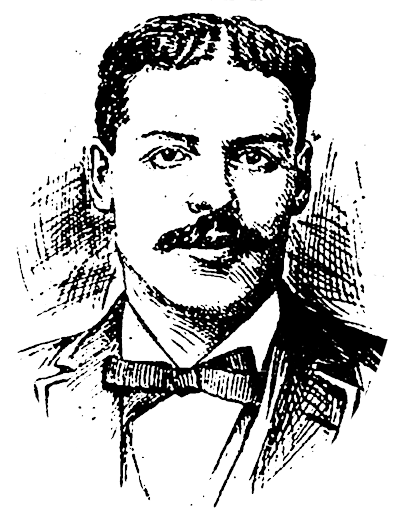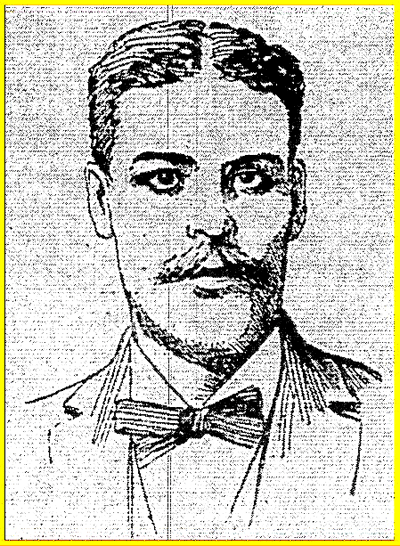 Graham is blocked from taking his House seat
Graham is blocked from taking his House seat
A Republican teacher, postal worker, and newspaper editor, Jesse M. H. Graham was elected in early November 1896 to represent Montgomery County in the 50th Tennessee General Assembly, 1897-1898. He was not only the first African American chosen to represent Montgomery County, but also the first Republican representative elected in that district since Reconstruction – reportedly by “the largest vote ever cast for a legislative candidate” in the county (Freeman, November 28, 1896). Jesse Graham seemed to be unstoppable until November 15, 1896, when the Louisville Courier-Journal reported that he had lived in Louisville until October 1895, not only holding a job there, but also registering and voting as a Kentucky resident. His opponent promptly called attention to the three-year residency requirement outlined in the Tennessee state constitution and challenged Graham’s eligibility to hold office. He was provisionally seated on January 4, 1897, while the Committee on Elections debated the issue. On January 20, 1897, after the committee declared both Graham and his opponent ineligible, the General Assembly passed a resolution, by a vote of 76-0 (with 23 not voting), declaring the seat vacant. Ten days later, in a lackluster election that “appeared to elicit little interest” among either city or county voters, Montgomery County elected Democrat John Baggett to the seat. According to several newspaper reports, the General Assembly soon passed a bill blocking the election of black candidates. It is undeniably true that no other African Americans were elected to the General Assembly from any county in Tennessee until 1964.
Graham was not the only elected legislator to be denied his seat in the General Assembly. David Rivers had already served one term before being driven from Fayette County (and the House seat to which he had just been elected) by racial violence. Samuel A. McElwee served three consecutive terms (and had even had his name placed in nomination to be Speaker of the House) before facing a similar fate in Haywood County, where he was physically driven out of the county by nightriders, and where corrupt election officials would later brag about misrepresenting the number of votes cast. After serving two House terms, John Boyd struggled unsuccessfully to reverse a fraudulent ruling in Fayette County that nullified his probable election to the Senate. Of all fourteen men who won House elections, only Graham failed to serve out at least one term to which he had been elected.
Early years and education
Jesse M. H. Graham’s story leaves us with almost as many questions as answers. He was born in either Nashville or Clarksville (accounts differ) and attended public schools in Montgomery and Davidson counties. Neither of his parents was a slave. The mystery of his two middle initials, which he never explained in print, may be solved by the story that his father, Monroe, a stone mason, was said to be the son of Sam Houston (hence the “M. H.,” standing for “Monroe Houston”) but was raised by a Major Graham in Gallatin, Tennessee, and took his surname thereafter. Whether true or not – and Sam Houston was certainly still living in Tennessee when Monroe was born – the story was widely circulated at the time, and several newspapers made reference to it. Jesse Graham’s closest friends reportedly called him “Fred Houston.”
After Graham graduated from high school in 1881 “with the best percentage attainable in that branch of study,” State Senator William M. Daniel nominated him for a Peabody Scholarship to attend Fisk University, where he studied “common” English and education. He made his mark as a talented orator but was also known as “almost a phenomenon in mathematics,” while showing “considerable dramatic talent in his rhetorical classes.” A period newspaper article said he was “the first colored boy to receive a state scholarship from the senatorial district.” As a Peabody scholar, his name appeared in the Minute Books of the State Board of Education in two separate entries. [The State Board, formed in April 1875, was responsible for overseeing the University of Nashville’s transition to Peabody College and for administering the Peabody Scholarships to both black and white students.] On November 30, 1881, Graham’s name appeared on a Board list under this heading: “The following Bills were presented, found correct, and ordered paid, Fisk University for the following students, viz. . . . Jessee Graham.” On January 19, 1883, the names of two future legislators appeared in the list after the statement, “The following bills from Fisk University were found correct and ordered paid: . . . Saml. A. McAlwee [sic] . . . Jesse M. H. Graham.” A third black legislator was also a Peabody Scholarship recipient: David F. Rivers’ name appeared on the list of Roger Williams University students in the April 24, 1883, minutes.
 Sketch of Jesee Graham
Sketch of Jesee Graham
A teacher and Post Office employee
After graduating from Fisk, Graham evidently taught school for some time in Clarksville and Kentucky (reportedly at Allensville, Elkton, and Bloomfield) – one source said he taught for eight or ten years “and was always considered among the best.” An 1891 city directory entry from Clarksville says he was running a saloon at 97 Strawberry Street. Around 1892 he moved to Louisville, where he scored so well on a civil service exam that he overcame more than 40 competitors to win a position at the Louisville post office. An admiring article in the November 28, 1896, Freeman said that Graham “soon became to be a recognized authority on all questions pertaining to postal laws” while also being rated as “the speediest stamper of third class matter in the United States.” After three years in Louisville, Graham evidently had a falling out with the new postmaster and returned to Clarksville, where he took over the editorship of the Clarksville Enterprise. Described as being “fond of music and an excellent performer on the slide trombone,” he was manager of the Clarksville brass band for some time.
According to Clarksville historian Charles M. Waters, local Democratic politics faced a surprisingly determined black opposition during the last decade of the 19th century. The economic depression that held the nation hostage had disrupted political business-as-usual, and a spirited voter registration drive in 1892 had brought out throngs of black voters, resulting in an African American majority. One of the first changes was the election of the first black city councilor in Clarksville’s history, John W. Page, who held the seat until 1899. Others followed: a second African American city councilor, Nace Dixon, was in office until 1913; Jerry Wheeler was elected to the County Court in 1894; and newspaper publisher Jesse M. H. Graham won election to the General Assembly, although, as we have seen, he was unable to keep his seat.
An article in the Freeman in May 1897 mentioned that he had “aided in Centennial work” in Nashville, perhaps assisting with activities in the Negro Pavilion. The 1917 city directory lists Graham as a teacher, and a Leaf Chronicle article from the same year says he was “formerly a school teacher in the colored public school of this city.”
An inspiration to poets
An African American newspaper carried this extraordinary poem, apparently written by a Clarksville merchant, after Graham’s election to the General Assembly:
OUR REPRESENTATIVE
Jesse Graham you well remember,
Was elected on the third day of November,
To a position that is due every honest-man,
Who shows he is a Republican throughout the land.
Montgomery county made a good selection,
Which was proven by the majority in this election.
The gallant old soldiers marched to the polls,
And casted their ballots open and bold.
He is a school-mate, citizen and a son,
To gain a broad reputation he has begun,
The position he will hold is a responsible one
We must stick by him; yes, everyone.
No matter the differences we’ve had in the past
We must unite in our solid mass,
And hold up this bright and brilliant son
For an example for our younger ones.
The young men showed with their aid and support
That they realized the value of every vote,
And hard at work the determined band
Succeeded in electing this noble young man.
Her children’s children they shall know
The good withheld from her,
And so her reverie takes prophetic cheer,
In the spirit she sees the stir.
For down the depths of a thousand years,
And marks the revel shine,
Her dusky face is lit with sober light
Sibylline, yet benign.
Composed by R. M. Outlaw of Kates and Outlaw, Tailors.
In a December 1896 article called “Assembly Portrait Gallery,” which included a pen-and-ink portrait of the newly elected Graham, the Nashville American described him as “well educated and unassuming in manner. He is not a politician in the strict sense of the word and has held himself aloof from factional fights in his county.” Regrettably, Graham himself would soon become the subject of an intensely personal fight that would strip him of his House seat.
Marriage
An 1897 article in the Cleveland Gazette stated that Jesse M. H. Graham had married a Fisk University classmate, Miss Anna E. “Murfree” of Louisville, Kentucky. An article in the Louisville Courier-Journal (December 1896) said she was the daughter of George W. Murphy, the sexton of Louisville’s Walnut Street Baptist Church.
Unfortunately, census records provide little helpful information about the handsome Mr. Graham’s marital status after the turn of the century, because he was listed as living alone at the time of each census from 1900 to 1930. The marital-status entry for Jesse Graham in the 1900 census is faded and illegible – it could be either an “M” (married) or a “W” (widowed), but it is impossible to tell. [Ancestry.com reads it as “Widowed,” and there are no further references to Anna, so that interpretation may be correct.] In 1920 Graham clearly stated that he was widowed. In 1930 the census indicated that he was married, but he was listed as living alone as a lodger in a boarding house. After his death in Washington, D.C., a few weeks later, information was provided for his death certificate by Geneveva Graham, who identified herself as his wife. None of the records located thus far have mentioned children.
Military service
There is some evidence that Graham may have served in the Spanish American War. A May 16, 1898, article in the Clarksville Leaf Chronicle reports,
J. M. H. Graham has received from the National Volunteer Reserve an enrollment roster, with instructions to secure the enlistment of colored volunteers for the United States Army. A meeting will be held at the courthouse to-night for the purpose of enlisting all volunteers. Steps have already been taken in this direction, about sixty volunteers having thus far been enrolled. Temporarily Jesse Firse has been selected as captain, L. L. Ferguson as First Lieutenant and J. M. H. Graham as Second Lieutenant. It is thought that a full company may be secured at to-night’s meeting.
At some point before the onset of World War I, Graham was sent to the Philippines as a clerk in the U. S. Bureau of Audit. He returned to Clarksville briefly, but was soon chosen by Colonel E. V. Smith of Nashville to be sent to Iowa for Army officer training. His selection for this program is further evidence that he may have had prior military experience.
During the first World War the U.S. Army commissioned more than 1,200 African American officers. The only training camp set up exclusively for black officers was in Fort Des Moines, Iowa, which was operational from June through October 1917. (A few other black officers received their commissions at officer training camps in France, but War Department records do not specify which of those were black and which were white.) Jesse Graham was one of the 638 officers of the 17th Provisional Training Regiment who graduated from officer training in the Fort Des Moines program. Commissioned as a second lieutenant in the Army on October 15, 1917, Graham was assigned to the 317th Engineers in Camp Sherman, Chillicothe, Ohio. Camp Sherman was just being organized: it opened on November 4, 1917, and demobilized on March 31, 1919.
Honorably discharged at war's end, Graham returned to Tennessee. Making his home once again in Clarksville, he served as an officer of St. Peter's African Methodist Episcopal Church and helped to found American Legion Post No. 143.
Later years

It is likely that Jesse Graham served in the Spanish American war, at least as a member of the National Volunteer Reserve. We know for certain, however, that he was commissioned and trained as an Army officer during World War I, serving with the 317th Infantry Engineers. He is buried in Section 4, Lot 2735, in Arlington National Cemetery.
(Photo by Kathy Lauder)
In later years Graham moved to Washington, D.C. He was residing there at the time of the 1930 census, in which he listed his occupation as “clerk,” presumably for the Bureau of Audit or some other government entity. According to District of Columbia records of deaths and burials, Jesse Graham died at the age of 65 (the census said he was 55) on July 25, 1930 – his death must have occurred very shortly after the census enumerator’s visit – and was buried four days later. Information for the death certificate, including his occupation, “Ex-soldier US Army,” was provided by his wife, Geneveva Garcia Graham.
The 1900 census for Lumberton, Rio Arriba County, New Mexico, lists 24-year-old Genoveva Garcia, born December 1875 in New Mexico. The 1910 census shows the same woman, now 35, working as a cook on the Jicarilla Apache Indian Reservation in Rio Arriba County. The name seems to have been fairly common among Hispanic women in the Southwest, but most of the other women in census records had taken the name Garcia through marriage. How Genoveva came to Washington, D.C., or how she met Jesse Graham, remains a mystery, along with many other facts of his life.
However, one fact that has eluded researchers for years has recently come to light: a few days after his 1930 death, Second Lieutenant Jesse “H” Graham of the 317th Infantry Engineers, was buried in Section 4, Lot 2735, of Arlington National Cemetery. KBL 11/06/2012
Sources:
Army Center of Military History. Fort Lesley J. McNair, Washington, D.C.
http://www.history.army.mil/html/forcestruc/lineages/branches/eng/0317enbn.htm
Caron’s Directory of the City of Louisville, 1894.
Caron’s Directory of the City of Louisville, 1895.
Clarksville Leaf Chronicle, May 16, 1898; June 14, 1917.
“Death of a Respected Citizen.” Freeman, May 15, 1897.
“Doings of the Race.” Cleveland Gazette, February 6, 1897.
Enterprise (Clarksville, Tennessee), February 13, 1897.
Granberry, Dorothy. “When the Rabbit Foot Was Worked and Republican Votes Became Democratic Votes: Black Disfranchisement in Haywood County, Tennessee.” Tennessee Historical Quarterly, Vol. LXIII, No. 1, Spring 2004.
Hastings-Johnson, Jill. Montgomery County, Tenn., Archivist. Notes.
“Hon. J. M. H. Graham, the Only Afro-American Member of the Tennessee Legislature.” Cleveland Gazette, January 2, 1897.
“In Memory of the Dead.” Freeman, October 16, 1897.
“J. H. M. [sic] Graham, Only Colored Member Elect of the Tennessee Legislature,” Lebanon Democrat (originally published in Louisville Courier-
Journal), December 3, 1896.
“Jesse M. H. Graham.” Freeman, November 28, 1896.
McBride, Robert M., and Dan M. Robinson. Biographical Directory, Tennessee General Assembly, Volume II (1861-1901). Nashville: Tennessee
State Library and Archives, and Tennessee Historical Commission, 1979.
Nashville American, December 18, 1896.
“Our Representative,” Clarksville Leaf Chronicle, November 16, 1896.
Scott, Emmett J. Scott’s Official History of The American Negro in the World War. 1919.
http://www.gwpda.org/wwi-www/Scott/SChA1.htm
“Squire Baggett Is a Winner.” Nashville American, January 31, 1897.
“The Stealers,” Daily Journal and Journal and Tribune, November 8, 1896.
Sweeney, W. Allison. History of the American Negro in the Great World War: His Splendid Record in the Battle Zones of Europe; Including a
Resume of His Past Services to his Country in the Wars of the Revolution, of 1812, the War of Rebellion, the Indian Wars on the Frontier,
the Spanish-American War, and the Late Imbroglio with Mexico. 1919
http://www.gutenberg.org/files/16598/16598.txt
Tennessee General Assembly. Journal of the House of Representatives of the State of Tennessee. Nashville: Tavel and Howell, 1881, 1883.
“Tennessee Legislature Meets at Nashville, Organizes and Prepares for Work.” Savannah Tribune, January 9, 1897.
Tennessee State Board of Education Minute Book #55. Tennessee State Library and Archives, Nashville, Tennessee.
Waters, Charles M. Historic Clarksville, 1784-2004. Clarksville, TN: Historic Clarksville Pub. Co., 2004.
